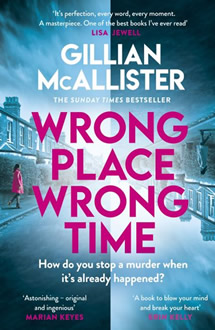Reviewed by Robert Goodman.
By Gillian McAllister, Penguin, $32.99.
 Time loops are everywhere these days. Groundhog Day might have popularised them (and in doing so entered the popular vernacular) but the narrative conceit has now gone high end. Recent examples on the screen include Russian Doll and Palm Springs, and on the page we have Claire North’s The First Fifteen Lives of Harry August, Kate Atkinson’s Life After Life and Stuart Turton’s The Seven Deaths of Evelyn Hardcastle. Gillian McAllister, both in her Acknowledgements and in this article in the Guardian, credits Russian Doll as the inspiration for her time-jumping crime novel Wrong Place Wrong Time, which asks the questions: How far into the past would you need to go to find the root of a present day crime? And what would one have to fix to prevent it?
Time loops are everywhere these days. Groundhog Day might have popularised them (and in doing so entered the popular vernacular) but the narrative conceit has now gone high end. Recent examples on the screen include Russian Doll and Palm Springs, and on the page we have Claire North’s The First Fifteen Lives of Harry August, Kate Atkinson’s Life After Life and Stuart Turton’s The Seven Deaths of Evelyn Hardcastle. Gillian McAllister, both in her Acknowledgements and in this article in the Guardian, credits Russian Doll as the inspiration for her time-jumping crime novel Wrong Place Wrong Time, which asks the questions: How far into the past would you need to go to find the root of a present day crime? And what would one have to fix to prevent it?
Jen is happily married to Kelly and the two have an 18-year old son, Todd. Todd has been acting a little strangely lately but nothing unusual. But on the night of Halloween, just after midnight, Jen watches horrified as Todd pulls a knife out of his bag and uses it to kill a man on the street outside their house. Jen wakes up the next morning and wonders how this could have happened:
Jen stares and stares at the door to her son’s bedroom. How had she come to raise a murderer? Teenage rage. Gun crime. Gangs. Antifa. Which is it? Which hand had they been dealt?
But before she can really consider this, she realises that it is not the next morning at all. Rather, she has woken up on the day before the crime. Once she processes that impossible fact, Jen goes about trying to change what is going to happen by finding the knife and taking it out of Todd’s bag. Before she can find out if that change has worked, Jen is back in her body of the day before. And realises that she can use this opportunity to learn a little more about Todd’s life and the things she might have missed.
By Day Minus Three, Jen realises that she has to ‘know the rules’:
That is what any lawyer would do. Understand the statute, the framework, and then you can play the game. All she knows so far is that nothing has worked, that she hasn’t managed to stop the crime. Surely, stop the crime, stop the time loop. That must be the key.
As she goes further and further into the past, accelerating as she finds herself in specific, important points in time, Jen gets further from the incident but deeper into the murkiness of her own past. She gets to see events that she lived through from a totally different perspective, one with foreknowledge. And with that knowledge, her relationship with Todd and Kelly, her relationship with her father, and her career, take on significantly new meaning:
How sinister it is to relive your life backwards. To see things you hadn’t at the time. To realize the horrible significance of events you had no idea were playing out.
But nothing is quite as it seems, even the second time around. McAllister does an excellent job of continually confounding readers who think they have figured the whole thing out. She does this partly by intercutting Jen’s narrative with the story of Ryan, a young policeman who ends up as part of an undercover operation to bring down a crime ring that deals in drugs and stolen cars.
McAllister uses the central conceit of Wrong Place, Wrong Time brilliantly. Time loop stories are usually about the protagonist becoming better. Each iteration of the loop they learn something about their world or themselves and slowly they improve. This book does that to some extent – as Jen goes back in time she gets to do over some of her mistakes and realise how much she has missed of her own life, particularly in relation to her son.
She’s here on Todd’s birthday, when she’s been absent so often. What makes someone commit a crime? Well, maybe it’s about her mothering of him. After all, does every action a child performs not begin with their mother?
But nothing is that simple and McAllister is not here to suggest that Jen is a bad mother, only that parenting is complex and fraught. And that perhaps sometimes parents should stop and take a breath and reflect on what they are doing rather than waiting until it is all too late.
The tale twists further again as it goes back to before Todd was born, every revelation making Jen re-evaluate her life but also getting closer to illuminating the start of the chain of events that lead to Todd’s crime.
The key, as Jen herself reflects, to a good time-travel tale is to have strict rules and stick to them. McAllister sticks to her rules reasonably faithfully so that the narrative hangs together. And while the book has a fantastical premise, this is much more than a crime novel: it is a deep investigation into the antecedents of a crime, and the long-term consequences of life-changing decisions with all of the twists and turns that go along with that.
This review first appeared in Newtown Review of Books.
Over 800 more book reviews can be found on Pile by the Bed.











